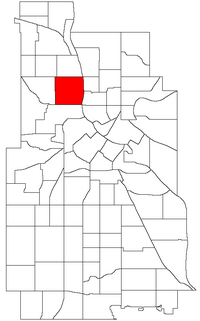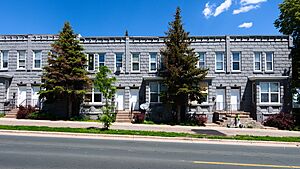Hawthorne, Minneapolis facts for kids
Quick facts for kids
Hawthorne
|
|
|---|---|
|
Neighborhood
|
|

Location of Hawthorne within the U.S. city of Minneapolis
|
|
| Country | United States |
| State | Minnesota |
| County | Hennepin |
| City | Minneapolis |
| Community | Near North |
| City Council Wards | 5 |
| Area | |
| • Total | 0.882 sq mi (2.28 km2) |
| Population
(2020)
|
|
| • Total | 5,608 |
| • Density | 6,358/sq mi (2,454.9/km2) |
| Time zone | UTC-6 (CST) |
| • Summer (DST) | UTC-5 (CDT) |
| ZIP code |
55411
|
| Area code(s) | 612 |
Hawthorne is a lively neighborhood in Minneapolis, a big city in Minnesota. It's part of the Near North community. The neighborhood is bordered by Lowry Avenue North to the north, the Mississippi River to the east, West Broadway to the south, and Emerson Avenue North to the west. A city council member named Jeremiah Ellison represents Hawthorne. The neighborhood got its name from a famous American writer from the 1800s, Nathaniel Hawthorne.
Contents
Who Lives in Hawthorne?
| Historical population | |||
|---|---|---|---|
| Census | Pop. | %± | |
| 1980 | 6,036 | — | |
| 1990 | 6,032 | −0.1% | |
| 2000 | 5,985 | −0.8% | |
| 2010 | 4,567 | −23.7% | |
| 2020 | 5,608 | 22.8% | |
The number of people living in Hawthorne has changed over the years. In 2020, about 5,608 people lived here.
Between 1980 and 2000, the neighborhood became much more diverse. The number of Black and Asian residents grew a lot. At the same time, the number of white residents decreased.
Young People in Hawthorne
The number of children and teenagers in Hawthorne increased quite a bit between 1980 and 2000. Specifically, the number of kids aged 5 to 17 almost doubled! This means more young people are growing up in the neighborhood.
On average, about 3 to 4 people live in each house in Hawthorne. The average yearly income for a household in the neighborhood is around $21,865.
Hawthorne Area Community Council
The Hawthorne Area Community Council is a special group that helps the neighborhood. It started in the 1970s. This group is a non-profit organization, which means it doesn't try to make money. Instead, it uses its funds to help the community.
How the Council Works
The council has a board of directors. These are people from the neighborhood who are chosen to help make decisions. They are elected at a yearly meeting, usually held at Farview Park. The council works on different programs to help people get involved in their community.
Community News
The council publishes a newsletter called the Hawthorne Vibe. It comes out four times a year. This newsletter shares important news and updates about the neighborhood.
Parks and Schools
Hawthorne is home to some important places. Farview Park is located here, and it's the oldest park in Minneapolis! There's also the Nellie Stone Johnson School for students. Near the Mississippi River, you can find Orvin Olson Park, another great spot for outdoor activities.


